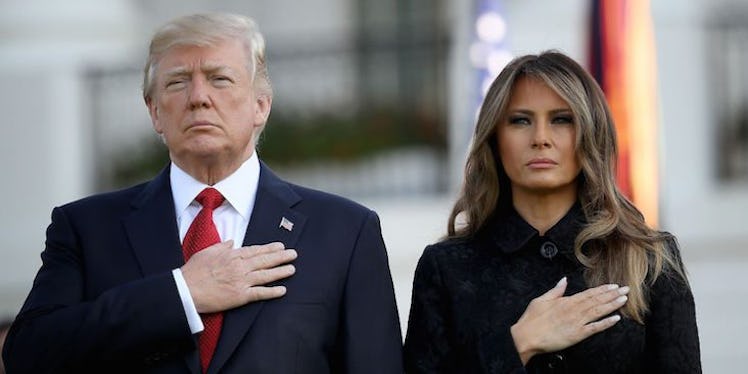
Differences Between Millennial Women's And Men's Views On Trump Say So Much
This might seem totally shocking, but as it turns out, millennial women and men apparently have very different feelings about President Donald Trump. Strange, right? I, for one, am floored that women feel differently than men about a man with a long history of sexist comments. The new 2017 Millennial Impact Report, which was released on Sept. 19 by Achieve and The Case Foundation, clearly shows millennial women and men's opinions on President Donald Trump, and, oh boy, there's a difference.
I met with Derrick Feldmann, the lead researcher, to talk about the new report. This new research involved a national survey of 3,000 Americans between the ages of 18 and 37 -- i.e. millennials. Sup. The survey was done from July 19 through Aug. 8 of this year, which may have played into some of the results (more on that later). The Millennial Impact Report checks out how our generation gets involved in causes -- and what causes we want to get involved in.
Overall, there's uncertainty about the Trump administration and the direction of the country, but "the vast majority still thinks these institutions, including government, are still places for change," Feldmann tells me. This translates into a lot of more traditional activism, like voting, signing petitions, contacting representatives, and showing up for marches and rallies.
"We have a demographic that is going to be vocal even though they may not like what's happening right now. They're not going to sit back and wait," Feldmann says.
Overall in this survey, 51 percent of the millennials voted for Hillary Clinton, compared to 35 percent for Trump, 5 percent for Gary Johnson, and 4 percent for Jill Stein. About two-thirds of those surveyed said they voted.
The research results based on gender are pretty telling -- and one data point in particular hit me pretty hard. Let's start with the general questions around Trump and America. About a quarter of millennial men surveyed (25.3 percent) said they were "extremely unsatisfied" with President Trump. Meanwhile, 43.4 percent of millennial women said they were extremely unsatisfied. On the other side of the spectrum, 14.7 percent of men were "extremely satisfied" with President Trump, compared to only 5.8 percent of women.
And when it comes to the issues themselves, Trump isn't doing much better with women. A little over half of millennial women (51.6 percent) said "President Trump has addressed the causes and social issues that are important to you" "not well at all." Compare that dissatisfaction to 32.7 percent of men. On the flip side, 11.8 percent of men think Trump's addressed issues important to them "very well," compared to 5 percent of millennial women.
In terms of the general direction of the country, again women are more unhappy, with 14.9 percent saying we're headed in the "absolutely wrong direction," compared to 10.5 percent of men. On the other side, 12.1 percent of men think we're headed in the "absolutely right direction," compared to just 3.4 percent of women. Yikes.
As Feldmann mentioned, we're a generation doing a lot of actions around things we care about. However, some of the research has been showing a lack of confidence that these actions are actually doing anything (you can say that again). There's a difference here between the perspective of female and male millennials -- and this is the data point that really hit me. Overall, 53 percent of millennials said that they believe their "actions will lead to improvements." By gender, 65 percent of men believe their actions can make a change, compared to just 41 percent of women. I wonder if a certain woman losing an election had anything to do with that disparity (Feldmann says they're doing more research into it in the next phase of the study).
Historically in this research, women are highly participatory in events. Last year, however, the research saw a little dip in that -- which Feldmann refers to as "a waiting-to-see scenario." This year, cause-based actions are up across the board with millennials, mostly in these more vocal forms like signing petitions and going to rallies. The issue millennials are most concerned about is civil rights/racial discrimination, followed by job creation and health care. But, Feldmann cautions, the survey took place while Congress was debating health care, which may be why it was so high up there.
"I think we have a generation that's not afraid to stand up for issues that they care about and not be muted in that way, which is really, really great," Feldmann says.
Moreover, the research is seeing that millennials aren't just showing up for causes that personally affect them -- they're showing up for other groups they're not a part of as well.
"We have a generation who might at times be seen as selfish -- at least in the general population -- and they're not. They're helping other groups, they're helping stances on other issues, whether or not it affects them personally," Feldmann analyzes.
Now, I'm most interested to see how this activism plays out in the next year with the 2018 elections coming up. Feldmann predicts, based purely on numbers, that millennials will have an impact on those elections. Are you up for that challenge?